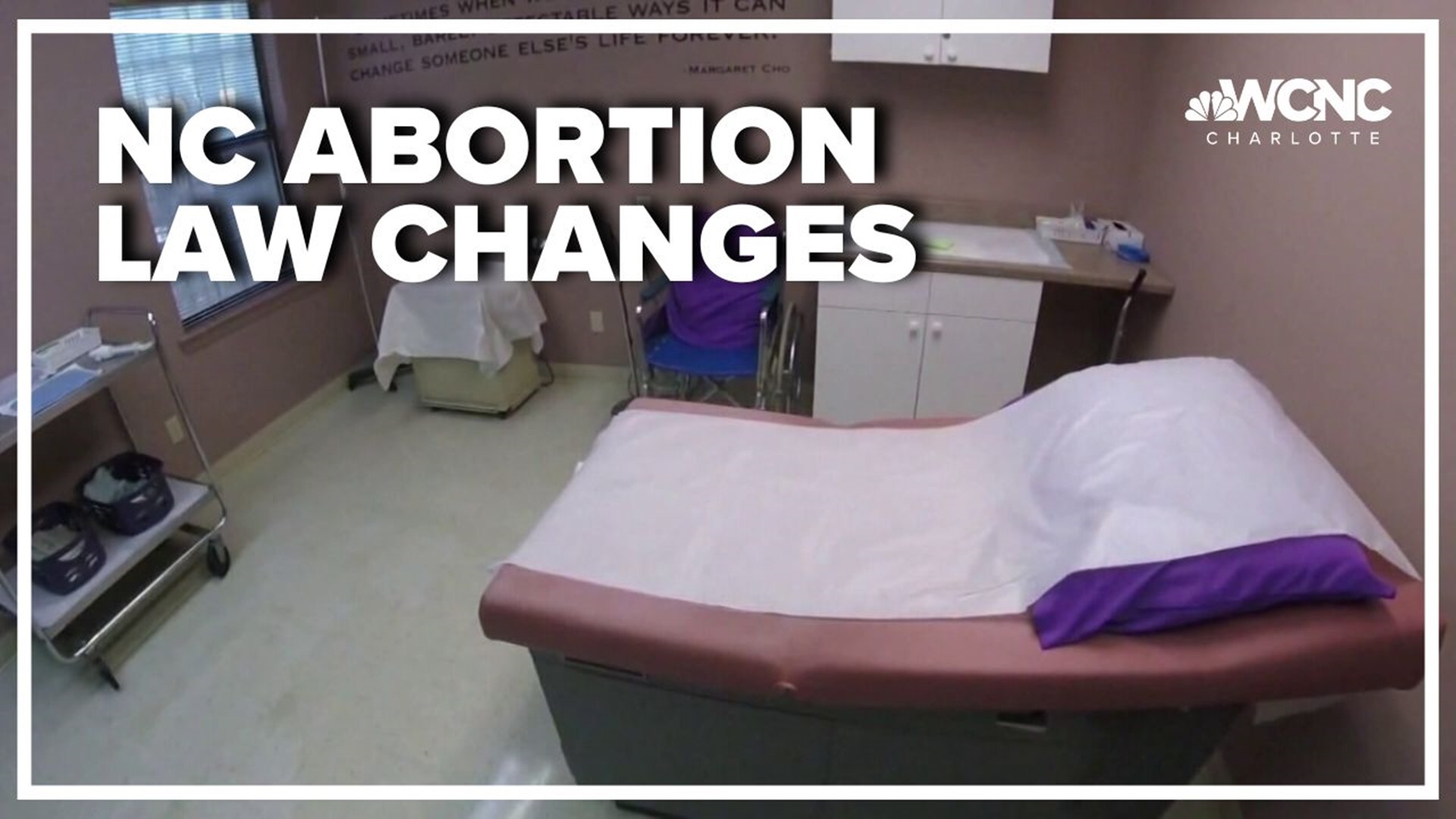RALEIGH, N.C. — Starting July 1, 2023, most abortions after 12 weeks of pregnancy will no longer be legal in the state of North Carolina.
The new restrictions on abortion in the Tar Heel State are a reduction from current state law, which allows abortions up to 20 weeks of pregnancy. However, a Republican supermajority in both chambers of the state legislature pushed the new law through, overriding Democratic Gov. Roy Cooper's veto against it.
WCNC Charlotte is taking a closer look at the law, breaking down what is and isn't allowed. We're also explaining current legal action involving it and further movement in the state legislature as Republicans make tweaks to the language.
What isn't allowed under the new law?
Under the new law, most abortions won't be allowed after 12 weeks of pregnancy. Partial-birth abortions are also totally prohibited at any time of pregnancy, as are "eugenic abortions". The law describes the latter as an abortion in response to a fetus' presumed race or racial makeup, sex, or likelihood or knowledge a child could be born with Down syndrome.
Breaking the law is deemed a Class D felony, which will include a fine of up to $250,000. The law also says anyone who tries to perform any act that kills a child born alive will face punishment for murder.
Additionally, it will be unlawful for anyone in North Carolina to mail abortion-inducing drugs like Mifepristone to others seeking a medication abortion. Anyone found doing so could face a $5,000 fine per violation.
So when is abortion allowed under the new law?
Abortion is legal anytime up to 12 weeks of pregnancy. Beyond that point, some specific carve-outs do exist.
If a physician determines a medical emergency necessitates an abortion, the new law does allow that during those first 12 weeks as well. An abortion can also be provided up to 20 weeks of pregnancy if the pregnancy is the result of rape or incest. Additionally, abortion is allowable through 24 weeks of pregnancy if a physician determines a threat to the pregnant person's life exists.
What else is in the law?
The new law also covers how parents can safely surrender infants, how courts can terminate parental rights lawfully, adoptions, and funding for family members fostering an infant once parents lose custodial rights. It also expands parental leave for state employees after giving birth, adopting or fostering a child.
Are there changes happening to the law before it takes effect?
Yes, but Republicans in the state Senate claim the changes are minor technical tweaks in the language.
State senators said the adjustments to the new restrictions are aimed at making the law as clear as possible. Sen. Ralph Hise from Mitchell County said on June 22 “We very much see it as something that is technical and clarifying", with no major changes to the law.
One of the revisions concerns medication abortions. As an example, while the law as written now broadly addresses medication abortions, Republicans are trying to revise it to say medication abortions, like surgical abortions, are allowed up to 12 weeks of pregnancy. But lawyers representing Planned Parenthood are at odds with Republicans about whether an amendment to the law is clear about helping a woman get an abortion outside of North Carolina in states where the procedure remains lawful beyond the ban's new limits.
However, the changes appear to be an attempt to thwart a pending lawsuit from Planned Parenthood South Atlantic and an OB-GYN in Durham that seeks to declare some or all parts of the law unconstitutional. The case is being heard by U.S. District Judge Catherine Eagles in Greensboro, although she said any temporary orders she hands down would be narrow in scope and limited to certain provisions being challenged.
NC Attorney General Josh Stein declined to defend parts of the revised abortion law that he deemed as "unconstitutional."
The General Assembly hopes that these changes will prevent the judge from blocking parts of the law from going into effect on July 1. On Thursday afternoon, Gov. Cooper signed into law the last minute revisions to the abortions restrictions. It is still possible for Eagles to temporarily block parts of the law from going into effect on Saturday.
Eagles is expected to rule on the Planned Parenthood's federal lawsuit on Friday.
Are there other effects being seen in North Carolina?
While it's difficult to discuss any immediate impacts, some organizations and advocates in favor of abortion access warn the Tar Heel State could see a shortage of OB-GYNs because of the law.
The Association of American Medical Colleges (AAMC) said new doctors applying for residency programs are looking at states with less restrictive laws on the books. State Rep. Maria Cervania, a Democrat from Wake County, claimed other states were already seeing OB-GYNs leaving.
"We've seen that those already practicing in states with enforceable abortion bans like Alabama, Arkansas, Kentucky, Louisiana are seeing a mass exodus when it comes to OBGYNs and maternal health care workers," she said during a speech on the House floor on May 16.
The AAMC notes OB-GYN residencies declined nationwide at a rate of more than 5%. States with strict abortion laws saw a 10.5% decrease in OB-GYN applicants, with the association saying those doctors feared for their medical licenses or the possibility of facing felony charges.
Stricter abortion laws - and the penalties associated with them - are also affecting classroom instruction according to Susan Roberts, an abortion politics expert at Davidson College.
"More and more medical schools around the country are not teaching procedures or access to abortion, and that is problematic," she said.

